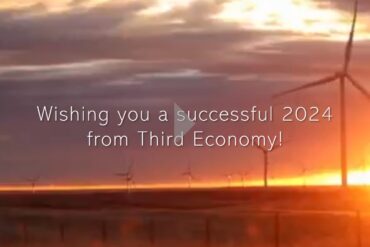Thought Leadership
Third Economy: 2023 Year in Review
By Third Economy Staff, January 2024
Wishing you a successful 2024 from Third Economy!
As we enter another new year, it’s a natural time to reflect on the moments that defined our work in the field of sustainability over the last twelve months and that push our industry and world forward.
Here are our top ten stories from 2023 that will continue to impact all of us in 2024 and beyond:
1. California Surpasses the SEC on Climate Disclosure Regulation
In October, California Legislature passed two new environmental laws, known collectively as the “California Climate Accountability Package”, both of which are expected to have a significant impact on California, U.S. and global businesses. Many of the world’s largest public and private companies will soon be required to disclose their greenhouse gas emissions and climate-related risks using TCFD, as well as their strategy to manage and mitigate climate-related impacts.
2. European Adopts Sustainability Reporting Standards
The European Commission adopted in July the European Sustainability Reporting Standards (ESRS), subject to the law called the Corporate Sustainability Reporting Directive (CSRD). The ESRS take account of the ISSB/SASB standards and GRIISSB Issuance of IFRS1 and 2 Guidance on SASB Standards and cover the full range of environmental, social, and governance issues, including climate change, biodiversity and human rights.
3. Fossil Fuels Targeted at COP28
The COP28 climate summit in Dubai concluded in December with nearly 200 countries making an unprecedented commitment to move away from fossil fuels. While the agreement fell short of requiring the world to phase out coal, oil and gas, it did call on countries to “contribute” to a “transition away from fossil fuels in energy systems.”
4. International Sustainability Standards Issued
In June, the International Sustainability Standards Board (ISSB) released its first two International Sustainability Disclosure Standards (IFRS SDS or the Standards) that become effective for periods beginning on or after 1 January 2024. IFRS S1 provides a set of disclosure requirements designed to enable companies to communicate to investors about the sustainability-related risks and opportunities they face over the short, medium and long term. IFRS S2 sets out specific climate-related disclosures and is designed to be used with IFRS S1.
5. Politicians Weigh In on ESG
ESG became highly political in the U.S. this year, with both parties taking different sides based on their misunderstanding of other technical concepts like impact investing and values-based investing and their application to constituents. The House held several congressional hearings that may result in bills in the future, but nothing has come yet. In the interim, companies are wordsmithing their ESG programs and reports to try and appease politicians and consumers. In practice however, ESG programs continue to advance at investors, because ESG helps them determine where to allocate their capital based on financial risk and opportunity consistent with fiduciary duty.
6. The Ozone Layer is Slowly Healing
The Earth’s ozone layer is on track to recover completely within decades, a UN-backed panel of experts announced in January, as ozone-depleting chemicals, including chlorofluorocarbons (CFCs), are being phased out across the world. The ozone layer’s subsequent recovery has been hailed as one of the world’s greatest environmental achievements.
7. World Bank Launches Global Flaring & Methane Reduction (GFMR) Partnership
Also at COP28, the World Bank launched the Global Flaring and Methane Reduction (GFMR) Partnership, a new multi-donor trust fund focused on helping developing countries cut carbon dioxide and methane emissions generated by the oil and gas industry. A group of major oil and gas companies including BP, Exxon, and Saudi Aramco also pledged to cut their methane pollution by at least 80% by 2030.
8. Global Renewable Power Growth is Surging
Global renewable capacity additions were set to soar in 2023. The unprecedented growth is being driven by expanding policy support, growing energy security concerns and improving competitiveness against fossil fuel alternatives. These factors are outweighing rising interest rates, higher investment costs and persistent supply chain challenges.
9. Brazil Joins Growing List of Latin American Jurisdictions Mandating Sustainability Reporting
In October, Brazil became the latest Latin American country to announce that the ISSB IFRS Sustainability Disclosure Standards will be incorporated into their regulatory framework. Both Chile and Columbia have mandated the use of TCFD recommendations and SASB standards and national standard-setters in Mexico are publicly discussion plans for use of the ISSB’s Standards. Further news from Brazil, deforestation has dropped to its lowest level in six years according to space agency data.
10. Third Economy’s “Firsts” in 2023
Third Economy is happy to announce the birth of Elliot Fredericks Herold, born on October 5th to Colleen Fredericks and her husband Chris Herold, joining big brother Luke to complete their family – a wonderful additional to our marketing team! We are also delighted to announce our first 3ECON engagement between Natalie Ganzel and her fiancé, Broydon Stufko and wish them well as they plan for their wedding next year.
We look forward to all the advancements in sustainability in 2024.
